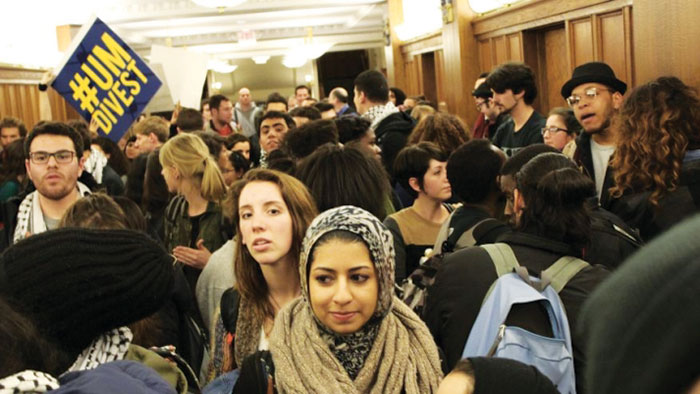The Boycott, Divestment, Sanctions (BDS) movement has noticeably gained momentum across college campuses in recent years.
But activists in the campaign, which aims to end international support for Israel’s oppression of Palestinians by challenging the financial support the state receives from government, corporations and institutions, were flabbergasted after the U.S. Senate swiftly passed a bill earlier this month aimed at barring them from criticizing the Jewish state on college campuses.
Titled the “Anti-Semitism Awareness Act of 2016” and pushed by both Republicans and Democrats, the measure intended to cap the uproar against apartheid that had been spilling across college campuses.
The bill, which endorsed the State Department definition of “anti-Semitism”, outlaws any sort of rhetoric that is “delegitimizing” to Israel or holds it to a “double standard.”
As of Monday, the bill was put to a halt in the House after Rep. Bob Goodlatte (R-VA.), chairman of the House Committee on the Judiciary, did not advance it through his committee. He reportedly opposed “rushing” the bill without an extensive study beforehand.
The bill’s sponsors, backed by mainstream Jewish groups, are likely to reintroduce a version of it next year.
But even if the bill sees its way through the government, Palestinian and human rights activists may be already used to such roadblocks.
“When it comes to activism in terms of Palestine and students, these intimidation tactics are nothing new,” said Summer Baraka, president of Justice for Palestine at Wayne State University. “These type of fear tactics have always existed as long as the activism scene has existed.”
Baraka told The AANews that the group’s 20 active members are not intimidated by the act and aim to push for divestment measures on the campus— a movement the university has not seen since 2003.
“For it to be enacted through law is a bit scary,” Baraka said. “But at the same time, students who are dedicating energy to a movement won’t be intimidated by such laws. For me personally, it’s not really a threat to me. These are attempts to try and weaken the movement. It shows the power that young people and students have.”
Baraka said Justice for Palestine frequently collaborates with students of different backgrounds, including the Black Student Union, to stand up against discrimination and injustice.
She said that if the “Anti-Semitism” measure aims to marginalize BDS, it will be a hard movement to shake off.
“Anyone who is concerned about justice is appealed to this movement,” she said. “The Palestinian movement has always been an intersectional solidarity movement. We’ve welcomed people of all colors and races. There’s a lot of strength in intersectional solidarity. The BDS movements are built on coalitions on all types of groups in standing in solidarity.”
UM-Dormant
In recent years, student bodies on campuses across the U.S. have demanded their universities divest from Israel with the passing of resolutions through their student governments, but the University of Michigan-Dearborn has been noticeably quiet in the anti-Israeli movement in recent years.
David Skrbina, a philosophy professor and longtime BDS activist, told The AANews that he seems to be fighting the battle on his own these days.
“With the student body that we particularly have at Dearborn, I would always expect it to be a leading charge among the whole U.S. on these kind of issues,” Skrbina said. “But no… In a sense, it’s kind of a disappointment that we don’t see more action from the students.”
The student government at UM-D has passed resolutions demanding the university divest from Israel on at least four occasions, the most recent four years ago. However, the resolutions are routinely dismissed by the university’s Board of Regents, which also has oversight in decision making policies for the Ann Arbor and Flint campuses.
Skrbina said students should not be discouraged by the failed attempts, noting that the message should be reiterated as much as possible.
“I always try to stress to them that it’s important to make the statement, even if it’s just a morale statement,” he said. “It does have an effect, even if it doesn’t achieve the divestment goal. It’s still important to make those statements on a regular basis and to document over a number of years that it is a regular concern among the student body and that we find this situation unacceptable.”
Skrbina said he is puzzled as to why the BDS movement seems to have fizzled in Dearborn, noting that if students feel intimidated or are scared of being surveilled, those concerns should be addressed.
Despite a less active Arab Student Union and a Student for Justice in Palestine organization that seem to be shying away from divestment talks, Skrbina continues to push for such measures among the faculty.
On two occasions, he presented an Israeli divestment resolution at the faculty congress, an annual meeting of all the faculty members. Both times, the faculty voted to reject it. Skrbina said even UM-D Chancellor Daniel Little spoke at the meeting urging faculty members to reject the resolution.
But Skrbina’s persistence seems to be leading to some progress, nonetheless.
“Even our more moderate faculty members are talking about putting forth a somewhat milder resolution at the upcoming faculty
congress in April,” he said. “Even the more cautious faculty is thinking they need to do something. Otherwise, I’m dominating the whole discussion and they don’t like that. They want something more softer that they can support.”
He called the milder resolutions a move in the right direction.
Skrbina also said an “anti-Semitism” bill would not discourage him from shying away from the movement–even if there is a possibility that he would get locked up.
“For my part, I will probably accelerate my efforts,” he said. “If it becomes a law, I should probably be prepared to get arrested because I might do something that is considered ‘illegal.’ And I will test them and see if they are willing to test me.”
‘Get louder’
Longtime activist Blane Coleman has spent years pressuring Ann Arbor’s City Council to divest from Israel and has organized with student groups to get similar measures approved on college campuses.
He dismisses the sheer notion of an “Anti-Semitism” bill.
“It is simply impossible for Congress to stop public shows of defiance against the racist, barbaric state of Israel,” Coleman said. “Even if Congress was insane enough to outlaw the BDS movement, we could all march straight into Congress the next day and demand a total cut off of aid to Israel because we have a right to petition the government for a redress of grievances.”
Students in Ann Arbor have met with much resistance when spearheading the BDS movement on campus. Some of them have expressed anxiety and paranoia in being affiliated with the movement— particularly in a city such as Ann Arbor, which has a robust number of Jewish lobbyists.
But Coleman said he believes the bill might have the opposite of the intended effect and could breathe new life into the movement.
“The only way for students to overcome this dread fear of being libeled as “anti-Semitic” is to get louder and louder in their righteous indignation against this lynch mob called Israel,” Coleman said. “This will give the students self confidence and power. Power is what they need; and they can only get it through public demands for boycott against their chief tormentor, which is Israel.”
Coleman cited the Black Panther Party movement of the 1960s as a guidebook students in Michigan should be using for the BDS movement, noting that it gained momentum through accumulating partnerships.
“If the students at Michigan spoke more like the Black Panther party of the 1960s, they would gain the best kind of allies and they would be able to look at themselves with respect in the mirror,” Coleman said. “This would force every Zionist to back down and give them room enough to demand boycott against Israel and to win that demand.”




